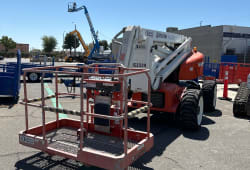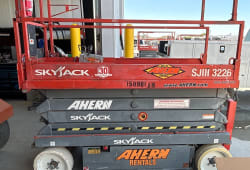Becoming a Pipe Layer: A Vital Role in the Construction Industry
5 Lectura mínima
)
octubre 15, 2023
In the vast and intricate world of construction, pipe layers play an essential role in ensuring the smooth flow of liquids and gases within buildings and infrastructure projects. These skilled workers are responsible for laying pipes, connecting pipe joints, and establishing pipe routes to create efficient pipe systems.
In this article, we will explore the career of a pipe layer, discussing what the job entails, the requirements for entering the profession, job requirements, the positive and negative aspects of the job, and where to find job opportunities.
Pipelayer Job Description
:format(webp))
Pipelayers are crucial to the construction industry. They specialize in installing and maintaining the network of pipes that make up the plumbing and utility systems of buildings, roads, and other infrastructure.
This involves working with a variety of materials, such as PVC, concrete, steel, or cast iron pipes. Pipelayers ensure that water mains, drainage systems, and sanitation sewers are properly installed and functional. You'll also be working on a team, typically using magnetic or radio indicators to communicate between team members.
The primary tasks of a pipe layer include digging trenches and holes to lay pipe, grading trenches to the required depth and width, aligning pipes and positioning them within the trenches, sealing joints to prevent leaks, and connecting pipes to the auxiliary lines and other components of the piping system.
Pipelayers also conduct inspections to ensure that the installation process adheres to safety and installation protocols and local building codes.
How to Become a Pipe Layer
:format(webp))
To embark on a career as a pipe layer, you typically need a high school diploma or equivalent. While some pipe layers may learn on the job, many employers prefer candidates who have completed vocational training or apprenticeships for jobs in the construction industry. These programs provide the necessary skills, tools, and knowledge to work safely and effectively as a pipe layer.
Additionally, you should develop strong physical fitness, as the job involves working outdoors and often requires lifting heavy machinery, pipes, and welding equipment. Personal protective equipment is essential to safeguard against potential hazards, including exposure to dust, fumes, and the elements.
Positives of Being a Pipe Layer
:format(webp))
Becoming a pipe layer offers numerous advantages for those who thrive in a dynamic work environment. Here are some of the positives associated with this career:
High Demand: Pipelayers are in consistent demand, as construction projects, infrastructure developments, and building maintenance are ongoing needs in society.
Outdoor Work: If you enjoy working outdoors and appreciate the variety that each project brings, being a pipe layer may be an ideal fit for you.
Diverse Projects: Pipelayers work on a wide range of projects, from residential buildings to commercial complexes, highways, and sanitation systems, providing ample opportunities to learn and grow.
Hands-On Work: This career is well-suited for individuals who prefer hands-on work, as pipe layers use a variety of hand tools and heavy equipment to complete their tasks.
Solid Earnings: The salary for pipe layers can be substantial, especially for those with experience. Earnings may vary depending on location, experience level, and the type of projects you work on.
Negatives of Being a Pipe Layer
:format(webp))
While the career of a pipe layer offers many advantages, it's also essential to consider the potential drawbacks:
Physical Demands: The job can be physically demanding, involving lifting and carrying heavy pipes, equipment, and materials. It also requires stamina to work in outdoor conditions.
Work Outdoors: While some people enjoy working outdoors, it's important to acknowledge that exposure to weather conditions and the elements is part of the job. Pipelayers may have to dig trenches, seal joints, drill holes, and operate heavy equipment, all in unpleasant weather conditions.
Potentially Hazardous: The work may expose you to potentially hazardous conditions, such as exposure to dust, fumes, wet cement, and other chemicals. Safety protocols and personal protective equipment are vital.
Long Hours: Some projects may require long hours to meet deadlines, and this can sometimes impact work-life balance.
Travel: Depending on the location of projects, you may need to travel and spend extended periods away from home.
Where to Find Pipe Layer Job Opportunities
:format(webp))
If you're interested in pursuing a career as a pipe layer, there are various avenues to explore for job opportunities:
Construction Companies: Many pipe layers find employment with construction companies, as they are integral to the construction process. Look for job listings on the websites of construction firms or inquire about job openings directly.
Job Search Websites: General job search websites like Indeed, LinkedIn, or Monster often list openings for pipe layers. You can search for positions based on your location and preferences.
Local Unions: Joining a local construction or pipe layer's union can provide access to job listings, as well as networking opportunities and apprenticeship programs.
Apprenticeship Programs: Many pipe layers start their careers as apprentices. Look for programs in your area that offer apprenticeships in the construction industry.
Construction Industry Trade Shows: Attend trade shows or industry events related to construction and plumbing. These gatherings often feature job fairs and opportunities to network with potential employers.
Conclusion
:format(webp))
In conclusion, a career as a pipe layer in the construction industry is a crucial and rewarding profession that plays a vital role in ensuring the functionality of buildings and infrastructure.
While the job has its physical demands and challenges, it offers the benefits of job security, outdoor work, diverse projects, and the potential for competitive earnings.
If you're interested in hands-on work and have the required skills and qualifications, becoming a pipe layer could be a fulfilling career choice. To find job opportunities, consider reaching out to construction companies, doing jobs, exploring job search websites, or joining local unions and apprenticeship programs.











